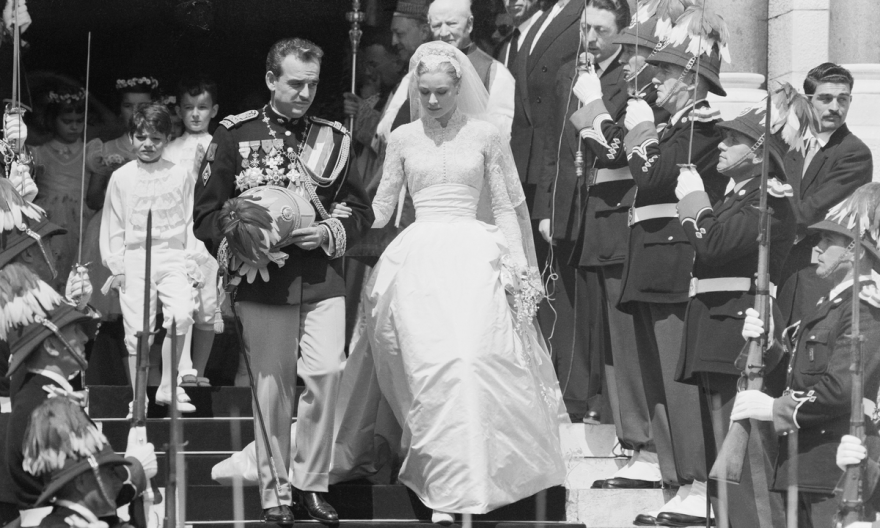
Grace Kelly’s wedding dress made history as the grand ceremony was the first royal nuptials to be televised live to 30 million people across Europe, courtesy of MGM. (In pre-satellite TV/internet days, American fans anxiously waited for the physical film to be flown back to the States.) An unprecedented 1,800 journalists descended upon the European principality for what could also be considered, by modern-day standards, the first broadcast celebrity wedding. Around 600 guests, including Hollywood A-listers, like Cary Grant, Gloria Swanson, Ava Gardner and tycoons, including Aristotle Onassis and Conrad Hilton, watched as the silver screen and fashion icon took her vows in an ivory silk faille and 19th-century Brussels rose-point lace gown by MGM costume designer Helen Rose.
With sublimely intricate details, like seed pearls accenting needle lace motifs and a pleated silk faille cummerbund atop the skirting, Grace Kelly’s wedding-dress style continues to be interpreted—even by royals and celebrities—over six decades later. “The reason Princess Grace’s wedding gown still resonates today with so many brides has at least as much to do with who wore it, as the dress itself. The design is lovely and timeless, but the way the dress sits at an intersection of Hollywood and royalty makes it particularly evocative and very much an aspirational fantasy piece for many brides,” says Lorenzo Marquez, author, podcaster, and cofounder of fashion and culture website, Tom + Lorenzo. “Kate Middleton was particularly smart to evoke the dress without copying it, underlining her own status as a commoner marrying a prince, but also avoiding any comparisons to previous brides in the British royal family.”
Reportedly, Grace Kelly and her wedding-dress designer, Rose, who previously collaborated on High Society and two additional films, may have mined the MGM archives for inspiration. The graceful V-front lace bodice of Dorothy McGuire’s gown in 1952’s Invitation, as well as Elizabeth Taylor’s high-collar neckline and long sleeves in 1950’s Father of the Bride—both by Rose—offer a sartorial throughline. (Rose also custom-designed Taylor’s dress for her first marriage to Conrad “Nicky” Hilton Jr. in 1950.)
“Rose was a longtime veteran of Hollywood. She was trusted by Grace Kelly, but also by Lena Horne and many other great stars of the period,” explains Oscar-nominated costume designer Dr. Deborah Nadoolman Landis, distinguished professor and director of the David C. Copley Center for the Study of Costume Design at the UCLA School of Theater, Film, and Television. “The relationship between a costume designer and an actress is one of trust and intimacy.”
Under top secret auspices of MGM, Rose created the dress with the studio department resources, including with 30 seamstresses. The two-time Oscar winner specially designed the circular veil, held in place with a traditional lace and pearl-embellished Juliet cap (instead of an expected tiara), to brilliantly showcase Kelly’s illustrious visage for the black-and-white television screen.
“Grace Kelly’s face was the jewel in a lace setting. A high-neck, long sleeves, lace cap, and long veil; The only skin showing was her magnificent face and her hands. That is a great design, courtesy of a master: Helen Rose,” says Nadoolman Landis. (Rose also created Kelly’s elegantly chic pale pink taffeta and Alençon lace tea-length dress, also accented with a Juliet cap, for the civil ceremony a day earlier.)
But Kelly’s ceremony ensemble also featured subtle, heartfelt details honoring her marriage, like a pair of diminutive lovebirds sitting amidst the exquisite lace appliqué trim around her gossamer-sheer veil. “Those were intimate, more private elements that were clearly important,” says Brisa Carleton, CEO of the Princess Grace Foundation, which continues the cultural and philanthropic legacy of the late Monegasque royal.
Instead of carrying an elaborate bouquet, Kelly held a small bundle of lilies of the valley and a customary prayer book titled, Bride’s Manual: A Manual of Catholic Devotion With Mass for the Marriage Ceremony and the Nuptial Blessing. MGM’s costume department customized the tome with lace, silk, and pearls to match the native Philadelphian’s gown. “It was a bride’s manual that was given to her by a family friend from the Philadelphia area,” says H. Kristina Haugland, the Le Vine associate curator of costume and textiles and supervising curator for the Study Room at the Philadelphia Museum of Art, where Kelly’s wedding ensemble and book are preserved. “It was personal and something that meant a lot to her at the time,” adds Haugland, also author of Grace Kelly: Icon of Style to Royal Bride.
David Evins, a favorite of American First Ladies and Hollywood starlets, custom-designed Kelly’s wedding shoes with a modest two and a half inch heel, supposedly to not overtake her betrothed in height. The New York City–based designer personalized Kelly’s right shoe with the prince’s name and her own on the left—and concealed a keepsake. “There was a lucky penny in her shoe, which is an old tradition,” says Haugland, who enlisted the museum’s conservation department to X-ray the heel in 2005 for official confirmation of the lore. In honor of the prince and princess of Monaco’s 50th anniversary, the Philadelphia Museum of Art displayed the gown in the spring of 2006. The gown remains one of the museum’s most popular pieces.
“It is probably one of the most timeless and iconic wedding gowns in history,” says red carpet and wedding stylist Micaela Erlanger. “Not just because it was worn by Grace Kelly princess of Monaco, but because it really was just the most understated, yet elegant and unexpected gown choice that has really stood the test of time.”





